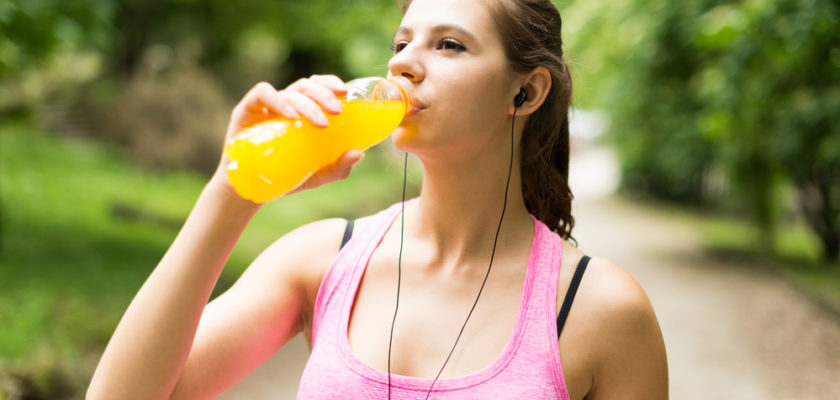Gone are the days when one needed to make up his energy drink himself before hitting the gym for a long workout session. Today, energy boosters are ubiquitous, and each brand claims to be backed by science, featuring the typical image of a scientific lab filled with white-coated people doing tests in their ads.
The question is, all these claims aside, do energy drinks really work? Can they replace your morning jolt, pre-workout, or bananas before hitting the gym for an intense training session? Or is the whole thing a mere marketing ploy designed to get you to spend money on a useless beverage? Let’s find out!
How Effective Are Energy Drinks?
There is no sense denying it; coffee is not doing it anymore, it just lost its charm.
In a world where coffee shops are around every corner, our tolerance to caffeine coming from the go juice has increased, which triggered the increasing the demand for something stronger.
Something that would get you through your afternoon meetings or courses without you falling for slumber in the middle of them.
Something that can pump your workout and give you an energy boost during your training sessions.
Got the hint yet? Yes, we’re talking about energy drinks, a beverage that conquered the energy market and gave people what they needed in terms of both physical and mental performance.
Did you know that 4 billion cans of Red Bull were chugged around the world back in 2010? And that the global market value of energy drinks hit $43 billion back in 2016? We’re not even done yet. Did you know that the global sales volume of energy beverages reached around 11.5 billion liters in 2015?
If anything, all those numbers show that energy drinks aren’t a joke and that they are here to stay.
Energy drinks brands, including ours, aim at providing a new, modern, energetic solution for anyone seeking endurance, productivity, and performance anywhere around the world.
Are you trying to stay awake in class during the afternoon? No problem, gulp down a can of Rockstar, and you’re good to go.
Want an effective pre-workout that would boost both your energy and spirit during your training sessions? Sure, get yourself a can of Red Bull, your body will love the pump.
The question is, behind all the hype that surrounds energy drinks, is it safe to assume that they’re as effective as everyone claims? How do they compare to homemade pre-workouts or the good ol’ peanut butter and jelly sandwich? Can they really get you through a meeting with your annoying boss?
What Do Energy Drinks Contain?
It goes without saying that the main ingredient in energy drinks is caffeine. It’s the molecule that pumps blood through your veins and boosts your energy during your workouts.
Besides caffeine, the blend also contains supplemental ingredients such as vitamins and amino acids and of course, the good ol’ sugar. Yep. Despite the fancy cans and slick marketing, sugar is still there in the mix, and it’s the one responsible for the energy boost. That’s not necessarily a bad thing though, as the equation is quite plain and straightforward; calories equal energy, according to Katherine Zeatsky, a dietician at the Mayo Clinic in Rochester, Minnesota.
According to Zeatsky, energy drinks should be regarded as calorie drinks, as that’s what our bodies use for fuel. Whether you’re eating a hamburger, a tuna sandwich, a chicken, or an energy drink, it all boils down to how much calories you’re consuming.
Energy drinks pack a whopping amount of calories. For example, a 16-ounce can of Rockstar contains 420 calories.
While those numbers may seem frustrating, energy drinks have the edge over other foods because the calories they deliver come from simple sugar, making them available for fast metabolism and consumption by the body cells.
To put things into perspective, know that a full meal, despite packing a lot of calories, contains carbs, proteins, and fats, all of which take time to digest and produce energy. So, while a typical meal may take hours to give some power, energy drinks provide that effect immediately.
The world isn’t all sunshine and rainbows though, as your body can only consume so much energy at a time. When the cells reach a certain level of glucose, the pancreas releases extra insulin to push the un-needed sugar to fat cells. So, if you’re not planning to hit the iron after gulping your energy drinks, you may end up gaining weight in the long run.
To make it available for anyone, many energy drinks brands produce sugar-free beverages, which rely on caffeine rather than sugar to boost energy and stimulate alertness, which is the case for Monster, Red Bull, and Rockstar.
Table could not be displayed.As the FDA doesn’t limit the amount of caffeine in energy drinks, most brands pack 50 to 200 milligrams in their 16-ounce cans, which is similar to what you get in a cup of coffee, which usually contains 40 to 180 milligrams of the jolt molecule.
Always remember to check the label when shopping for energy drinks, as some brands may go beyond the 200 milligram-limit.
While one may think that more equals better, and even though the idea of getting more energy throughout the day may seem intriguing, it’s actually a bad idea to get big doses of caffeine as that can cause nervousness, headaches, insomnia, and nausea.
Energy Drinks Do Not Replace Food
Energy drinks are supplements, not meals. They can be a great way to boost both your physical and mental performance, but if you feel tired without them, it’s probably because you’re not getting proper nutrition and adequate sleep.
Before resorting to energy drinks, make sure that you’re not skipping meals, and that you’re getting all the necessary nutrients from natural sources. Aim at 400 to 500 calories per meal, and get snacks containing 100 to 200 calories at intervals throughout the day. These snacks should combine lean proteins, fiber-rich carbs, and healthy fats for the best results.
Verdict: Are Energy Drinks Effective?
In short, as long as you’re consuming energy drinks within the safe, healthy limits, you’re bound to get a significant energy boost every time. Should you choose to turn a blind eye to health guidelines, energy drinks can turn into a nightmare and wreak havoc on your body.
If you’re convinced and ready to dive into the energy drinks world, check Monster’s wide selection of flavors, you’ll surely find something that suits your taste.
Table could not be displayed.
